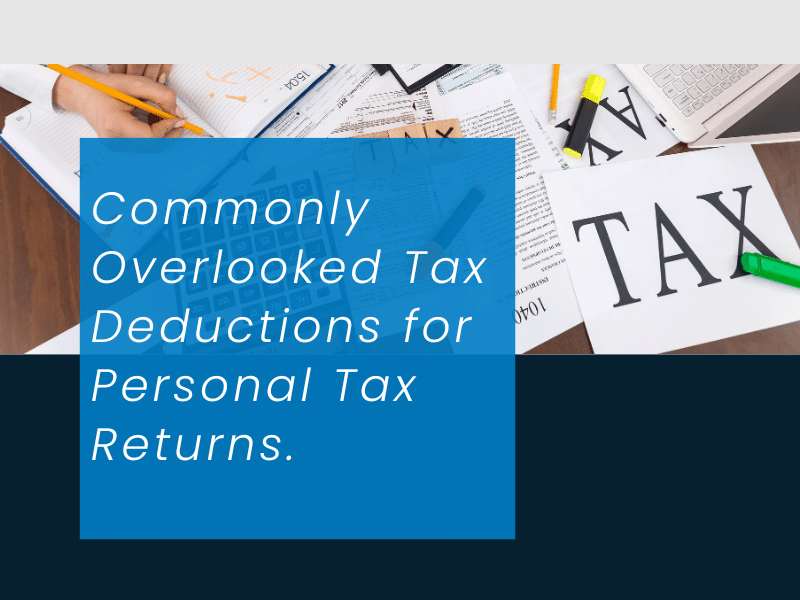Commonly Overlooked Tax Deductions for Personal Tax Returns
Taxes are an unavoidable part of life, so saving as much money as possible should always be top of mind. But with so many deductions and credits out there it can be daunting trying to figure out which ones apply specifically to you. Here we discuss 10 commonly missed personal tax return deductions which have the potential of saving hundreds or even thousands each year; from home office expenses to medical costs they often go unnoticed by taxpayers – grab yourself some coffee and join us as we discuss some valuable deductions which could keep more cash in your wallet during tax season.
What Are Tax Deductions?
A tax deductions is any expense which can be deducted from a taxpayer’s taxable income and used as an incentive, for instance charitable donations and home office costs. By deducting these expenses from their taxable income and thus decreasing tax liabilities you can lower your bill and pocket more of that hard-earned money.
Tax Deduction Benefits
The advantages of tax deductions are twofold; they reduce your tax bill while incentivizing certain behaviors such as charitable giving. A lower tax bill provides extra funds that you can put towards meeting financial goals or spending/saving.
Tax deductions can play an essential role in stimulating the economy. Home office expenses, which qualify as tax deductible expenses, encourage individuals to work from home and start businesses from within their homes – creating jobs while spurring economic development. Unfortunately overlooked tax deductions include home office costs.
1. Home Office Deduction
If you work from home, a home office deduction could benefit you. This tax break entitles you to deduct part of your housing expenses such as rent, mortgage payments, utilities bills and insurance in proportion to how much of it is dedicated exclusively and regularly for business. In order to qualify, your primary place of business must serve exclusively and regularly for such activities in your own residence office space.
2. Charitable Donations
Charitable donations can be tax deductible; yet many people neglect them when filing their tax return. If you donated money or goods to charitable organizations during the tax year, and were eligible for deduction, be sure to retain paperwork showing this donation such as receipts from organizations as proof. In order to claim it for deduction purposes.
3. Medical Expenses
Medical expenses can be expensive, but they could be tax-deductible if they exceed a set percentage of your adjusted gross income (AGI). You can generally deduct medical expenses that aren’t covered by insurance such as deductibles, copays and out-of-pocket expenses incurred from services like deductibles. Please keep in mind however, cosmetic procedures or over-the-counter medication typically aren’t tax deductible.
4. State and local taxes
State and local taxes are tax-deductible, yet many people overlook them when filing their tax return. You may deduct state- and local income, sales, property, and sales tax payments up to $10,000 annually in this category.
5. Job Search Expenses
If you were actively job-searching during the tax year, deductible job search expenses may apply. Specifically, travel, resume writing fees and placement agency costs could qualify. In order for them to qualify as tax deductions though, expenses related to current occupation must also qualify – you must also be searching in this same field.
6. Education expenses
Education expenses that relate directly to your profession or occupation can be deducted as tax-deductible expenditures, including tuition, books and supplies that you require in your job/profession – so tuition bills or costs related to maintaining/improving job skills cannot count; only new career development expenditures qualify.
7. Retirement contributions
Retirement contributions may be tax deductible; yet many individuals forget them when filing their taxes. You can deduct contributions made to traditional IRAs, 401(ks, or any qualified retirement plans when filing taxes; keep in mind however, that how much of this deduction you are allowed depends upon factors including income level and type of plan you own.
8. Miscellaneous Itemized Deductions
Miscellaneous itemized deductions encompass expenses such as tax preparation fees, investment management costs and safe deposit box rental costs that exceed 2% of AGI; they may qualify for tax deductibility as of 2018. Unfortunately however, as of 2018 this deduction has been suspended until 2025.
Overall, many tax deductions that can save hundreds or even thousands of dollars when filing personal income taxes often go overlooked. From home office expenses and charitable donations, to deductions that apply specifically to you and tracking of expenses that could maximize tax savings – take the time to learn about which deductions pertain to you so you maximize savings this tax season!









